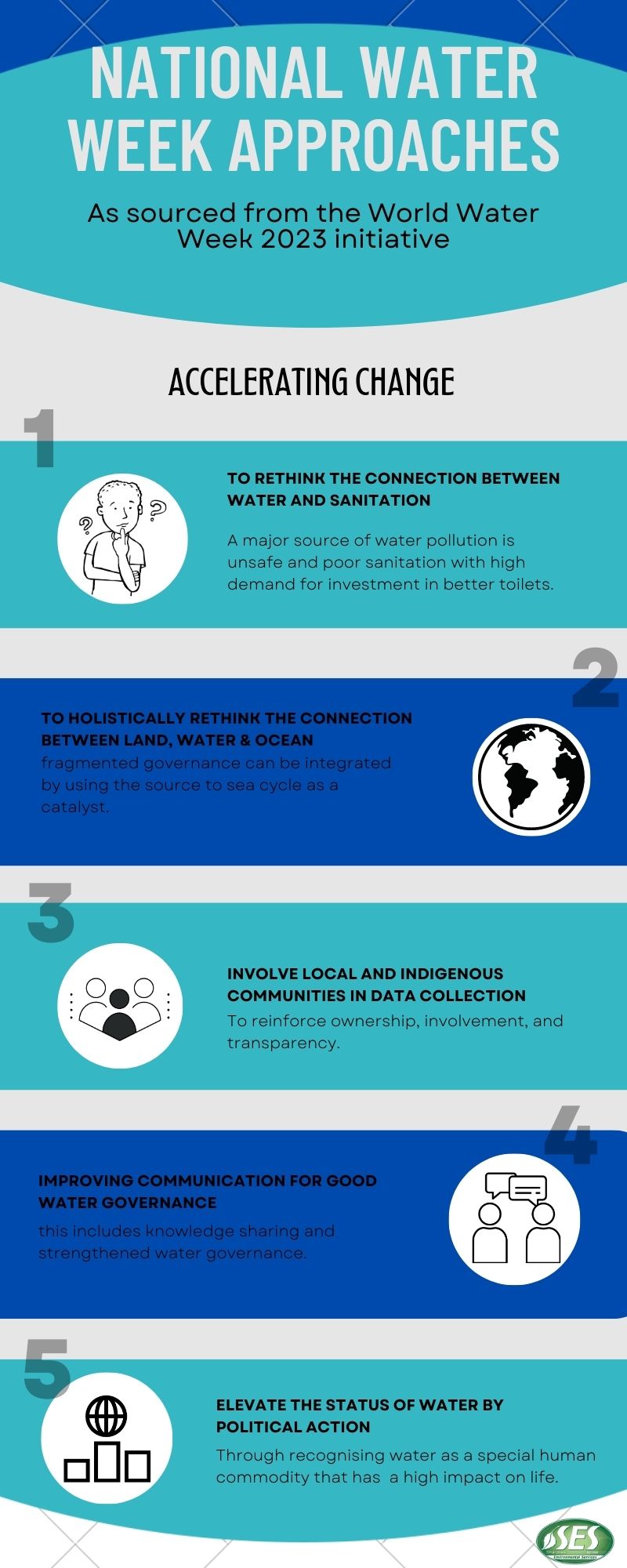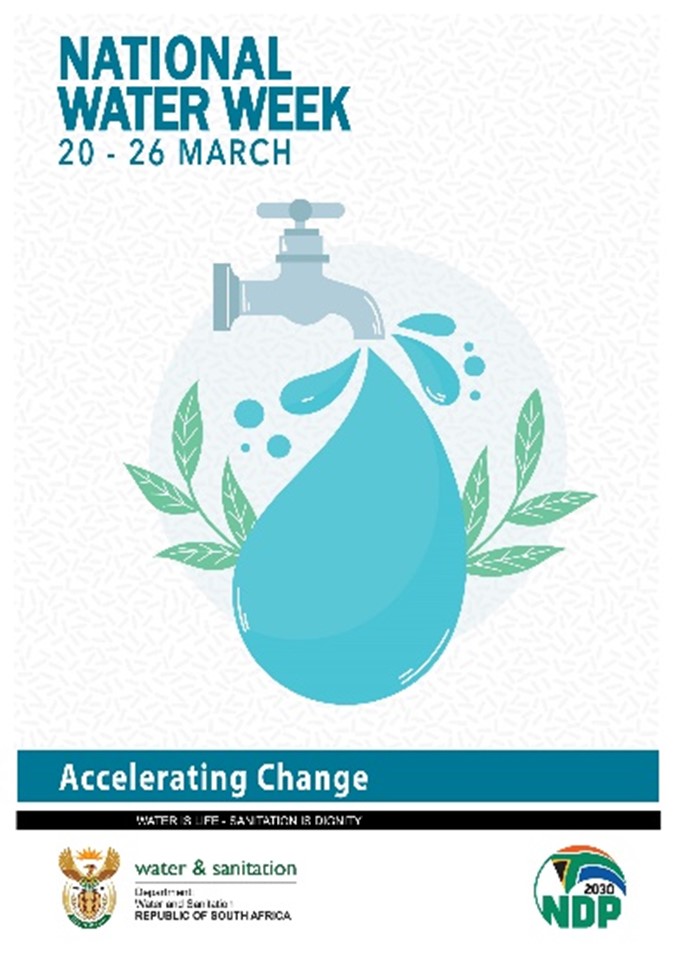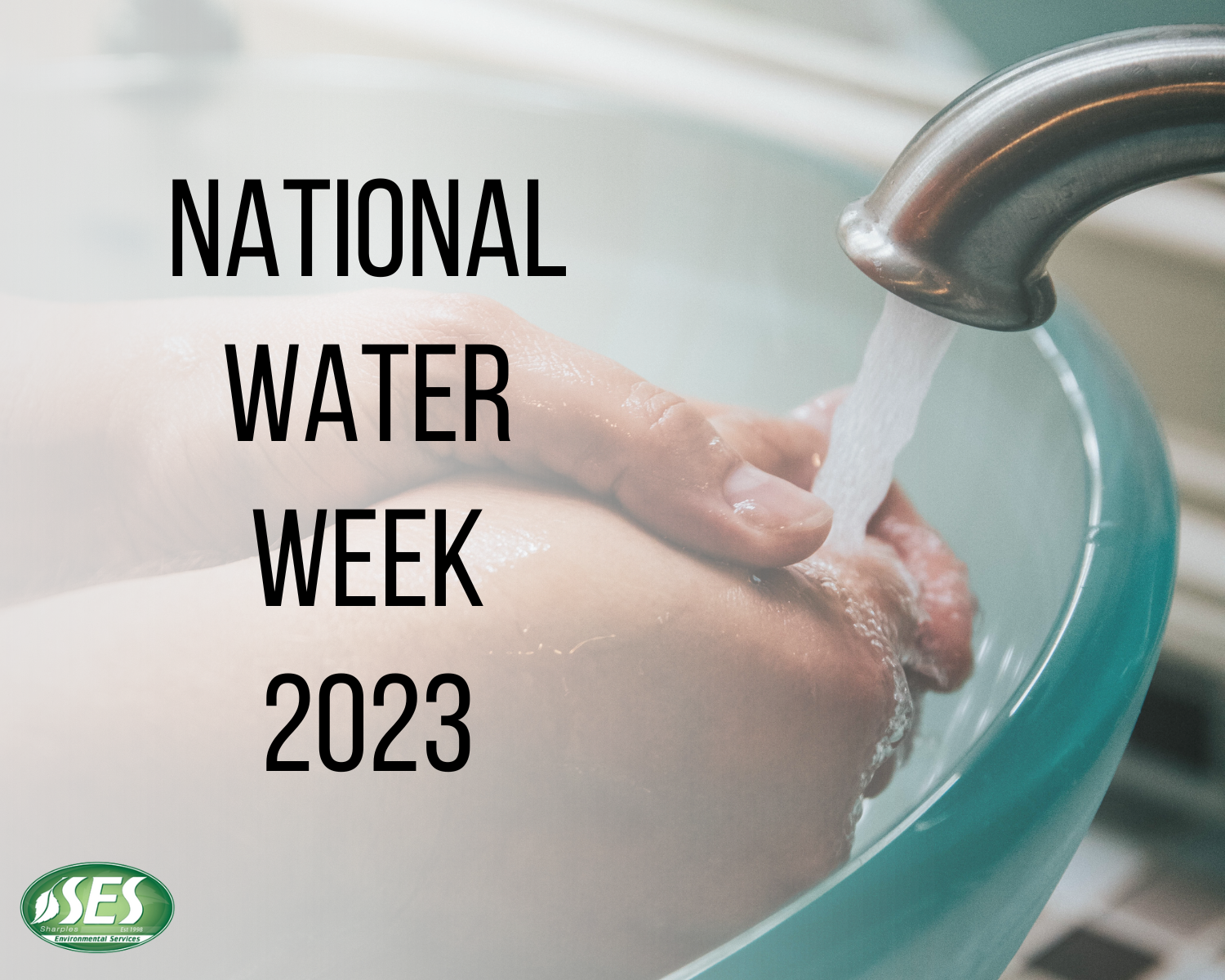This week the Department of Water and Sanitation (DWS) is celebrating National Water Week in South Africa. The 22nd of March also marks World Water Day 2023, a day abserved by the United Nations that highlights the importance of fresh water. The theme for this year is “Accelerating Change” and seeks to urge policy and decision-makers, inside and outside the water community, to heighten efforts to ensure universal access to water (DWS, 2023).
This week, Sharples Environmental Services (SES) is also celebrating this initiative and we will be looking at 5 approaches for change which can be considered as presented by the World Water Week organisation (World Water Week, 2023), namely:
To rethink the connection between water and sanitation.
A major source of water pollution is unsafe and poor sanitation conditions with high demand for investment in better toilets.
According to Goal 6 of the Sustainable Development Goals (SDGs) (as accessed on 17 March 2023), it was recorded that in 2020, two billion people live without safely managed drinking water services, including 1.2 billion people lacking even a basic level of service. The current projections for 2030 sees that 1.9 billion people around the world will lack basic hand hygiene facilities in 2030.
According to the World Bank (2003, as accessed on 17 March 2023), poor hygiene, inadequate quantities and quality of drinking water, and lack of sanitation facilities cause millions of deaths around the world on an annual bases. As a result of these conditions, these individuals are left vulnerable to diseases and infections.
The lack in sanitation facilities can be combatted through ensuring that toilet facilities are more readily available, specifically in rural communities, located along the upper reaches of the freshwater systems. In South Africa, organisations such as Donate A Loo aims to provide safe, reliable, decent sanitation as a means to restore dignity to school children. These are just one of many organisations that can be supported with the same end goal.

To holistically rethink the connection between land, water & ocean.
Fragmented governance can be integrated by using the source-to-sea cycle as a catalyst.
Fragmented governance reflects on the literal fragmentation of an public administration. Therefore, a government system is divided into a number of units in that specific area. According to the UNEP’s Global Partnership on Nutrient Management, land-based sources have a major impact on planetary health and on the oceans (UNEP, as accessed on 17 March 2023). The source-to-sea cycle describes the way upon which the land-based sources of pollution affect the land itself, the water on it, and the eventual destination of these polluting sources.
Integration of the fragmented government would rely on all units to identify their own sector within the source-to-sea cycle and through that create a set of guidelines for the respective sectors which would contribute to the system as a whole.
Involve local and indigenous communities in data collection to reinforce ownership, involvement, and transparency;
According to a study conducted by Nelson et al (2021) to determine how community participation in water and sanitation interventions impacted the infrastructure and service longevity in low-income and middle income countries, it was found that five mechanisms were the driving forces behind the longevity of water and sanitation infrastructure provision initiatives. They included accountability, diffusion, market, ownership and shame. Contextual elements identified included community leadership and communication, technical skills and knowledge, resource access and dependency, committee activity such as the rules and management plans, location and the level of community participation.
An example of where citizens have been approached to assist in data collection is through the SenseMaker tool. This tool was adapted by a team of researchers from Stellenbosch University and Rhodes University, respectively. This tool has been placed in the hands of community activists in the Western Cape. They have been approached to collect and collate data from areas across the cape flats. As indicated by Associate Professor Ziervogel (News website, as accessed on 17 March 2023) this date will help build water resilience in the Cape Flat communities.
Improving communication for good water governance; this includes knowledge sharing and strengthened water governance;
Policy and institutional fragmentation are amongst the biggest governance challenges facing water regulation in South Africa (OECD iLibrary , 2023). There are particular areas where improvements can be made such as, strengthening water resource management and financing at the catchment level, promoting innovative approaches to manage water balance and complete water allocation reform, improving the economic regulation and financial sustainability and efficiency of water and sanitation services, enhancing capacity, as well as strengthening transparency, integrity and engagement (OECD iLibrary , 2023).
To elevate the status of water by political action and to recognise water as a special human commodity that has a high impact on life.
Water has a profound impact on our planet and is the source of life as we know it, however fresh drinking water only forms a small part of this and the majority of water on earth is in the form of salt water. Clean freshwater is highly important for drinking, sanitation, irrigation, livestock, and industry, and creating and sustaining the ecosystems on which all life depends (UN Environment Programme, 2023).
The Department of Water and Sanitation (DWS) is the custodian of South Africa’s water resources. DWS aims to promote effective and efficient water resources management to ensure sustainable economic and social development. As part of National Water Week, DWS has lined up a series of activities and panel discussions to bring attention to South Africa’s state of water. These discussions will be led by some of the top minds in the water sector, in government and outside government (DWS, 2023).
How can SES help?
SES provide clients with clear guidance and advice on an array of environmental services. We have extensive experience in government liaison, undertaking water use and waste authorisation applications. Furthermore, we are deeply involved in the local community and conduct thorough Public Participation Processes as part of the environmental processes.
SES can assist in establishing whether your project would require an authorisation and the type of authorisation that would be required in terms of the National Water Act (Act No. 36 of 1996) and Environmental Impact Assessment (EIA) Regulations as promulgated under the National Environmental Management Act (Act No. 107 of 1998).
For professional environmental services, Contact us: info@sescc.net or (021) 554 5194.

References
DWS. (2023, 03 16). National Water Week 2023. Retrieved from Department of Water and Sanitation: https://www.dws.gov.za/campaigns/NationalWaterWeek2023/default.aspx
OECD iLibrary . (2023, March 17). 4. Strengthening water governance in Cape Town: Policy recommendations. Retrieved from Water Governance in Cape Town, South Africa: https://www.oecd-ilibrary.org/sites/9d4682c1-en/index.html?itemId=/content/component/9d4682c1-en
UN Environment Programme. (2023, March 17). Why Does Water Matter? . Retrieved from United Nations Environment Programme: https://www.unep.org/explore-topics/water/why-does-water-matter
World Bank. (2003, December). Water, Sanitation & Hygiene. Retrieved from The World Bank: http://web.worldbank.org/archive/website01213/WEB/0__CO-75.HTM#:~:text=Water%20supply%2C%20sanitation%20and%20health,children%20are%20the%20main%20victims.
World Water Week. (2023, 03 16). LinkedIn. Retrieved from World Water Week: https://www.linkedin.com/company/world-water-week/posts/?feedView=all













